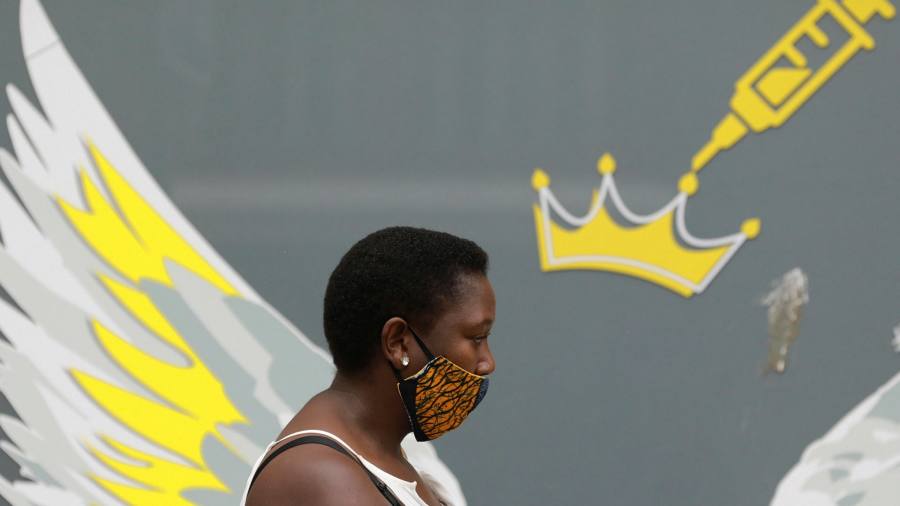[ad_1]
The Oxford/AstraZeneca Covid-19 vaccine does not appear to offer protection against mild and moderate disease caused by the viral variant first identified in South Africa, according to a study due to be published on Monday.
Although none of the more than 2,000 patients in the study died or was hospitalised, the findings, which have not yet been peer reviewed, could complicate the race to roll out vaccines as new strains emerge.
In both the human trials and tests on the blood of those vaccinated, the jab showed significantly reduced efficacy against the 501Y.V2 viral variant, which is dominant in South Africa, according to the randomised, double-blind study seen by the Financial Times.
“A two-dose regimen of [the vaccine] did not show protection against mild-moderate Covid-19 due to [the South African variant]â€, the study says, adding that efficacy against severe Covid-19, hospitalisations and deaths was not yet determined.
The so-called Kent variant — which Oxford university said on Friday was just as susceptible to the vaccine as older variants of the virus — has now acquired the E484K mutation, which is present in the variants fuelling Covid-19 surges in Brazil and South Africa.
There are caveats to the study, as the sample sizes were relatively small. The study, led by South Africa’s University of the Witwatersrand and Oxford university, enrolled 2,026 HIV negative individuals, with a median age of 31. Half the group was given at least one dose of placebo, with the other half receiving at least one dose of vaccine.
Tulio de Oliveira, who heads the Network for Genomic Surveillance in South Africa, told the Financial Times the findings were a “wake-up call to control the virus and increase the response to Covid-19 in the worldâ€.
Health authorities worldwide hope vaccines will reduce or completely eliminate the burden of hospitalisation, which would allow for lockdowns to be eased.
While important, it is relatively less urgent to avert symptomatic, but milder, infection that does not progress to hospitalisation.
Any setback for the efficacy of the Oxford/AstraZeneca vaccine would be particularly crucial for the developing world, as the partners are producing billions of doses on a non-profit basis during the pandemic.
The vaccine still appears to be fully effective in preventing hospitalisation and death caused by other variants of coronavirus, according to data from other studies.
AstraZeneca initially declined to comment. It later said it had not been able to properly ascertain the effect of the vaccine on severe disease and hospitalisation caused by the South African variant in the study given most of the participants were young, healthy adults.Â
“We do believe our vaccine could protect against severe disease, as neutralising antibody activity is equivalent to that of other Covid-19 vaccines that have demonstrated activity against more severe disease, particularly when the dosing interval is optimised to 8-12 weeks,†it said, adding other immune responses, such a T-cells, may protect against disease. Initial data, it said, indicated those responses “may remain intact†against the South African variant.
It noted that it had begun to adapt the vaccine against this variant with Oxford, advancing rapidly through clinical development “so that it is ready for autumn delivery [if] needed”.
Oxford declined to comment on the results of the study, saying only that it was working with partners across the globe, including in South Africa, to evaluate the effects of new variants on the first generation of its Covid vaccine.
“Oxford is working with AstraZeneca to optimise the pipeline required for a strain change should one become necessary,†the university said. “This is the same issue that is faced by all of the vaccine developers, and we will continue to monitor the emergence of new variants that arise in readiness for a future strain change.â€
The University of the Witwatersrand did not respond to requests for comment. South Africa’s Department of Health did not immediately respond to a request for comment.
While all Covid-19 vaccines so far have largely held up against the B.1.1.7 variant that emerged in the UK, the strain that originated in South Africa has been more worrying. Both Johnson & Johnson and Novavax have said their vaccines were less effective against the strain in clinical trials conducted in South Africa. In trials, both vaccines offered complete protection against severe disease and death in relation to Covid-19.
Moderna has said it will test a booster shot and a reformulated vaccine to target the South African variant, after studies showed its vaccine was significantly less effective.
BioNTech/Pfizer said their vaccine was slightly less effective in a lab study using a pseudovirus with some mutations from the 501Y.V2 variant, but have not published results of tests against the variant itself.
The 501Y.V2 variant, dominant in South Africa, has recently been discovered in countries all over the world, including the US and the UK.
South Africa took delivery of 1m doses of the AstraZeneca vaccine last week, the first Covid-19 vaccines to arrive in the country, as part of a 1.5m dose order from India’s Serum Institute.
[ad_2]
Source link






